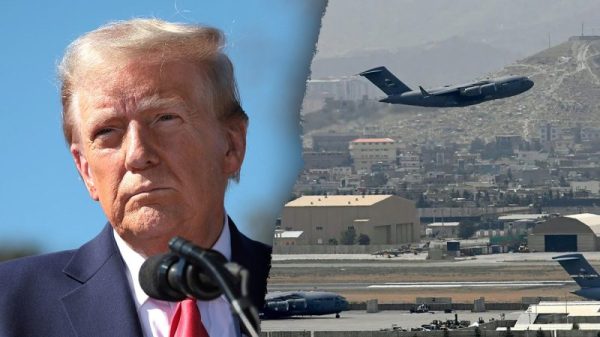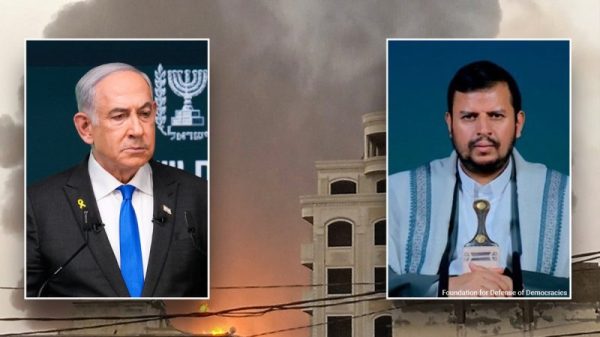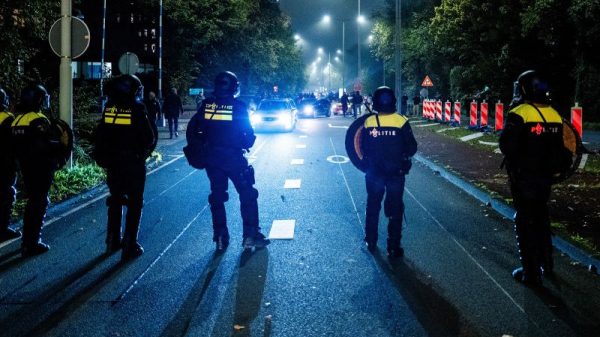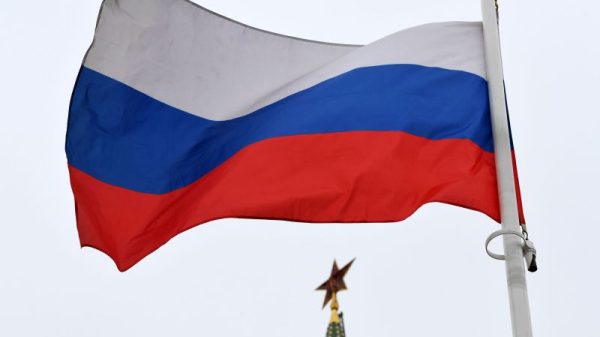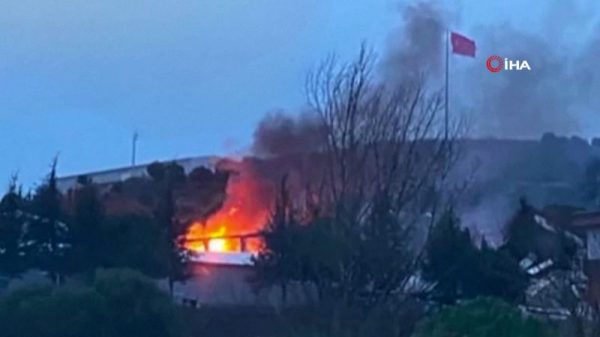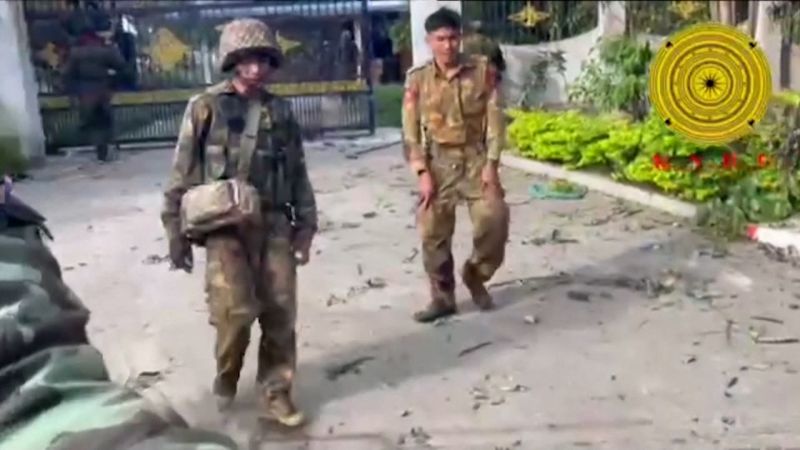Almost three years on from its bloody coup, Myanmar’s military junta is facing the biggest threat to its hold on power as it fights wars on multiple fronts across the Southeast Asian nation.
In recent weeks, powerful armed ethnic militias have joined with resistance forces to mount major new offensives with unprecedented coordination, exposing the limits of the deeply unpopular junta’s capabilities as it loses strategic border towns, key military positions and vital trade routes at a scale not seen in decades, according to experts.
“The junta is actively collapsing right now and that’s only become possible because there is this wider effort across the country,” said Matthew Arnold, an independent Myanmar analyst.
Calling it an “existential moment for the military,” Arnold said the resistance is “now focused on taking major towns to fundamentally defeat the junta.”
An offensive named Operation 1027, launched in late October by an alliance of three powerful ethnic rebel armies in the country’s northeast, has since catalyzed into a nationwide push to take control of towns and areas in Myanmar’s north, west and southeast.
Nearly 200 civilians have been killed and 335,000 people newly displaced by the fighting since October 27, according to the United Nations.
Civil war between Myanmar’s myriad ethnic armies and successive military governments has raged for decades. But the latest escalation in fighting comes off the back of nationwide public resistance to army chief Min Aung Hlaing’s February 2021 coup, which sacked the democratically elected government of Aung San Suu Kyi.
The military’s post-coup crackdown on peaceful protesters and documented atrocities against civilians spurred people to take up arms and defend their towns and communities in Myanmar’s rural and urban centers.
Since then, battles between the military and resistance groups aligned with the anti-junta National Unity Government in exile have unfolded daily. Junta airstrikes and ground attacks on what the Myanmar military calls “terrorist” targets have killed thousands of civilians to date, including children, and displaced about 2 million people.
Those on the ground say they are ultimately fighting to get rid of the junta and establish a federal democracy in which all of Myanmar’s people have full rights and representation.
Routing out a deeply entrenched institution like the military, which has ruled for half a decade though brutality and fear, will not be straightforward, and the military’s refusal to back down could drag Myanmar deeper into conflict.
But while the latest escalation in conflict since October 27 has not yet stretched to major cities like Yangon, Mandalay, or Naypyidaw, it marks a turning point in that resistance. According to the UN office for humanitarian affairs (OCHA), armed clashes are now the biggest in scale and most extensive seen since the coup.
Turning point
Announcing its October offensive, the Three Brotherhood Alliance involving the Ta’ang National Liberation Army (TNLA), the Kokang’s Myanmar National Democratic Alliance Army (MNDAA), Arakan Army (AA) and allied peoples defense forces, declared it was “dedicated to eradicating the oppressive military dictatorship.”
Its objectives were to “safeguard the lives of civilians, assert our right to self-defense, maintain control over our territory, and respond resolutely to ongoing artillery attacks and airstrikes.”
The alliance also vowed to combat the “the widespread online gambling fraud that has plagued Myanmar, particularly along the China-Myanmar border.”
In many of the towns dotted along the Chinese and Thai borders, Chinese-run compounds have boomed in recent years. Alleged to be centers of mass online fraud and illegal gambling and hosted by junta militias, they have trapped and trafficked thousands of people into working as online scammers.
Myanmar’s junta-installed president Myint Swe gave a rare warning at a defense and security meeting with the top brass in early November that, “if the government does not effectively manage the incidents happening in the border region, the country will be split into various parts.”
The junta has acknowledged it is engaged in “heavy assaults” and reportedly ordered all government staff and those with military experience in the capital to prepare to serve in case of emergency, according to Reuters. It has also imposed martial law in several northeast towns.
The armed forces “will continuously serve necessary security measures for ensuring peace and stability of the region,” it said during the defense meeting.
In state media, the junta has denied claims that it has stationed 14,000 troops in the capital Naypyidaw to protect the main military headquarters from the offensives, and denied it was recruiting public servants to attend military training, calling both “fake news and misinformation.”
Key border towns lost, reports of army troops surrendering
Severing those transport routes has cut off a vital revenue source for the internationally sanctioned and cash-strapped junta. The alliance claims control of Chin Shwe Haw and the roads leading to the town of Muse, through which 98% of all cross-border trade with China passes, amounting to $2.2 billion from April to October this year, according to Myanmar figures.
In western Rakhine state, ethnic minority armed group the Arakan Army (AA) renewed fighting after a year-long temporary ceasefire broke down, opening up a new front. Clashes with junta forces are ongoing in several townships and the town of Pauktaw has “turned into a war zone,” said U Nan Diya, a local village abbot monk.
There are also reports of army defections and whole battalions surrendering.
In hilly western Chin state, thousands of people have fled the fighting and crossed the Indian border to Mizoram. Among them were 43 Myanmar soldiers who fled after their military camps were seized by rebels, according to Mizoram police official Lalmalsawma Hnamte. Reuters reported that dozens were sent back to Myanmar.
“Because of lack of support from the civilians, the soldiers on the ground are lacking morale in fighting,” said Lin Lin, spokesperson for the Burma People’s Liberation Army, which is fighting in Myanmar’s north alongside the Three Brotherhood Alliance, and in the southeast.
“When we look at fighting leading to besieging towns, it’s not that they don’t have adequate weapons, but they lack the desire to fight, unlike before… Because of their lack of desire to fight, we are winning more.”
While some towns appeared to have fallen with relative ease, others say there is intense fighting in more central strongholds, where it is easier for the military to reinforce and resupply their troops.
“When the military column goes to a certain village, we try to distract them to not get to their targeted village by using offensive tactics. There are times we were outnumbered, we had to retreat, that’s when they attacked and destroyed the civilians,” said Bo Nagar, the BNRA commander in Sagaing region.
Military stretched thin
Analysts say ongoing losses suggest the military does not possess the sufficient manpower and fighting capabilities needed to retake them, despite relying on airstrikes and heavy weaponry.
“Predicting the ultimate outcome in the ongoing military progress is challenging, as I see it still in the initial phase of the resistance’s strategy. However, one certainty is that Operation 1027 has shifted the military equilibrium in favor of the resistance,” said Ye Myo Hein, fellow at the United States Institute of Peace and the Wilson Center. The military, he said, “is currently under relentless 360-degree attacks across the country.”
Analysis from Ye Myo Hein in May suggested the Sit-Tat, as the military is known, is much smaller than commonly thought, with about 150,000 personnel and 70,000 combat soldiers – “barely able to sustain itself as a fighting force, much less a government.”
There is rising concern that the junta is taking out its battlefield losses on the people.
Violence against civilians is a long-used Myanmar military strategy and there is a growing body of evidence that army troops have regularly bombed and burnt entire villages and committed other human rights abuses since the coup.
Since the start of the October offensive, monitoring groups have documented junta airstrikes and artillery hitting several Myanmar villages. On November 15, a military airstrike hit a village in Chin state’s Matupi, killing 11 people, including eight children, according to the National Unity Government.
What comes next
Saddled between global heavyweights China and India, with Thailand to its south and Bangladesh to its west, the fighting in Myanmar is threatening to disrupt relations with regional neighbors.
Without control of its borders and with fresh waves of refugees scattering into neighboring counties, the junta’s inability to bring stability to the nation risks angering one of its only global allies and main source of investment: China.
On Saturday, China’s military conducted live-fire drills and training on the Chinese side of the border with Myanmar, as fierce fighting raged on the Myanmar side, Chinese state media Global Times reported.
“The theater command forces are always prepared to respond to various emergencies and are resolute in safeguarding national sovereignty, border stability and the safety of the people’s lives and property,” said Senior Colonel Tian Junli, a spokesperson of the PLA Southern Theater Command, according to Global Times.
The paper reported the drills were part of annual training and were “defensive and aimed at safeguarding Chinese sovereignty, stability of border area and safety of personnel from impacts caused by the civil war in Myanmar, rather than an act to intervene in the internal affairs of the neighboring country.”
According to Arnold, Myanmar’s neighbors have now lost access to the country – a “brutal reality check” for the junta.
“All of the neighboring countries have invested significantly in maintaining positive relations with the junta. But as soon as they start to lose the access to Myanmar that changes their entire geopolitical calculus. I think it’s true of China, but it’s also true of India and Thailand,” he said.
Before 2011, Myanmar’s military ruled the country for more than half a century through brutality and fear, turning Myanmar into a poverty-stricken pariah nation.
Throughout years of conflict in Myanmar’s jungles and mountains, ethnic people have witnessed and been subjected to atrocities including massacres, rape and other forms of sexual violence, torture, forced labor and displacement by the armed forces, as well as state-sanctioned discrimination.
The coup abruptly ended a 10-year transition period that briefly ushered in greater democratic and economic reforms. But the military still retained outsized influence, and for many ethnic people the long documented abuses and violence continued under Suu Kyi’s civilian government.
Some analysts say Myanmar is now closer than ever to achieving that goal of defeating the junta.
“The important thing to be clear about is that a genocidal military can be defeated outright… That there’s not a need to have another 10 years of a so-called transition that is fundamentally premised or corrupted by the idea that you have to negotiate and accommodate a genocidal military,” said Arnold.
And there is cautious optimism among those fighting.
“In order to get to a federal democratic country for equal rights, we have become stronger by coordinating with each other,” said Bo Nagar.
“With this kind of unity, I believe we can quickly defeat the bullying military. And when it’s over, this kind of unity will be a foundation to rebuilding our country.”











